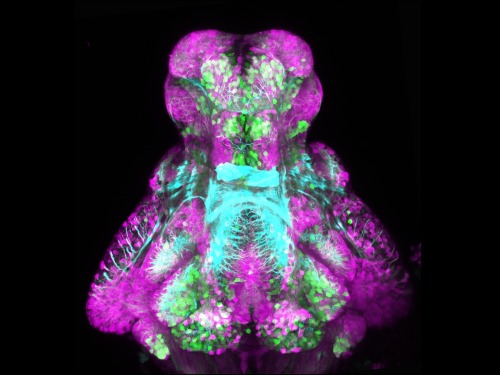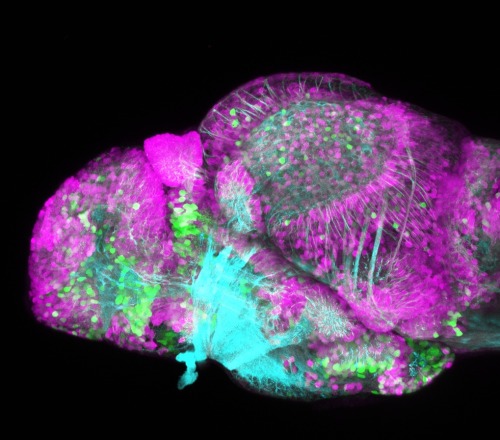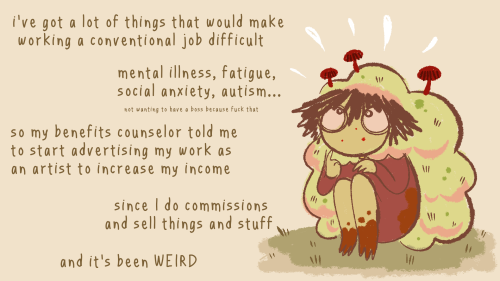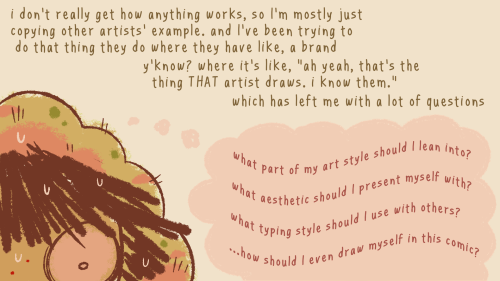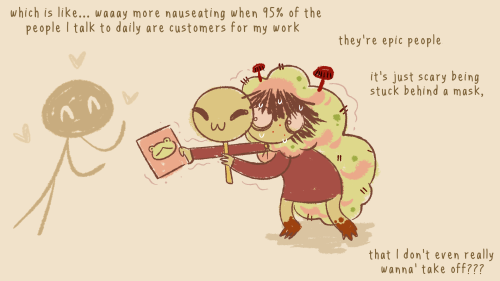#autism
Here are some tips for autistic people who hate brushing their teeth.
Brushing teeth can be a struggle for autistic people of all ages.
When I was a kid, I hated it and lied to get out of doing it. It took me until I was around 9 or 10 years old to finally learn to brush and floss by myself, and up until that point my parents had to do it for me- often while physically restraining me (otherwise I would try to run away because I hated it).
My parents never really investigated why I hated brushing my teeth, and I didn’t have the vocabulary to articulate or identify what was so repulsive about it. So instead, I got punished for lying about it and fighting them to get away from it. That led to countless meltdowns that could have been avoided.
So, here are some tips for those of you who, like me, have issues with brushing your teeth:
- Identify sensory aversions. What are the sensory reasons why you hate brushing your teeth? Is the toothpaste too strong, too minty, a weird flavor, too smooth, or too grainy? Is the toothbrush too rough, too soft, too loud, too big, too small, too short, or too long? Do you hate the feeling of something non-edible being in your mouth?
- Identify motor skills challenges. Do you have trouble moving the toothbrush around your mouth? Do you accidentally brush too hard or too softly? Do you accidentally knock the hard part of the brush against your teeth?
- Get creative to solve for sensory and motor challenges. For example, if the toothpaste is too strongly flavored and you keep unintentionally knocking the hard part of the brush against your teeth, buy milder toothpaste (perhaps a non-mint flavored kids’ toothpaste) and purchase a brush that has a smaller head with softer bristles. If you have trouble spitting out toothpaste, buy some that doesn’t have fluoride in it so that you can swallow it.
- Make the process fun! Is there some sparkly toothpaste that looks fun to you and makes for a good visual stim? Try it out. Is there a toothbrush that has your favorite colors on it, or that includes an image related to your favorite character or a special interest? Buy it! But remember that you have to avoid sensory issues, so only buy something if you know you’ll be willing & able to use it.
- Use a timer so that you know when to stop brushing. Sometimes it helps to know what to expect, and how long you need to be brushing for. Generally speaking, it’s good to brush your teeth for around 2 minutes. There are some very stimmy liquid timersyou can buy, to make the process more fun!
- Start the process slowly. If you have severe sensory issues that can’t be controlled and you haven’t been able to find solutions, you don’t need to force yourself to endure a full 2 minutes of brushing. Maybe you can start by just brushing with water for 30 seconds. Once you’re comfortable with that, move up to 1 minute with water. Then, 2 minutes. Once you’re at 2 minutes, add a tiny bit of toothpaste. Over time, work your way up until you can handle the full amount of toothpaste for 2 minutes.
Remember that physically brushing your teeth is much more important than using toothpaste. Even if you can only use water, that’s better than not brushing at all, because it still removes plaque and food particles.
And if you really can’t handle the toothbrush itself but you’re okay with toothpaste, you can still put some toothpaste on a wet washcloth and rub it over your teeth.
Even if you can’t or won’t brush your teeth in any traditional way, make sure that you’re using some method (like a toothpick) to clean in between your teeth and remove plaque from their surfaces.
Over time, I’ve become more sensitive to the negative sensation of plaque on my teeth, which has turned teeth brushing into a positive experience. However, I sometimes still avoid using toothpaste because I find the flavor or texture too overwhelming in the moment. If I don’t use toothpaste in the morning before going somewhere, I chew on a piece of mint gum instead so that my breath doesn’t smell.
Experiment with what works best for you, and know that it’s okay if your process looks different than other people’s. Cleaning your teeth in some fashion is much better than not cleaning them at all.
~Eden
Protesting as an autistic person: important tips and information.
Due to our sensory processing, communication, and emotional processing differences, autistic people need to be mindful of many things when attending protests. I will be separating tips into these categories: background information, clothing, supplies, social support, and self-regulation.
Background information
There are several key things you need to know about a protest before you attend.
- What is the nature of the protest? Is it a vigil, a local event in a small town, or a large protest in a city?
- What are the chances that you will experience police violence? Will you be exposed to tear gas, pepper spray, rubber bullets, etc.?
- Are there different events occurring throughout the day? Is there a schedule you can look at, to plan what actions you want to attend and which ones you don’t?
- Is there at least one other person you know who is going to the protest with you? It’s strongly recommended to only attend protests with a buddy, or a group of people you’re well-aquatinted with.
- If you need sign language interpretation, or if you’re physically disabled, is the protest accessible to you? If there are speakers, will you be able to understand them clearly? If you need to get somewhere quickly, will you be able to?
Clothing
As a general rule, especially if you’ll be attending a larger protest where there’s more of a risk of police violence and surveillance, you should wear dark, nondescript clothing that obscures your body shape and covers up identifying features like tattoos or birthmarks. Don’t wear necklaces, dangling earrings, or loose bracelets.
You should also be wearing a face mask, to protect you from coronavirus as well as police surveillance & public identification.
Here are some autism-specific tips:
- Try to wear clothing that doesn’t cause sensory issues. If tags bother you, make sure you cut them out. If certain types of fabric bother you, try to replace them with other kinds of fabric.
- If you have an ID bracelet that lets people know you’re autistic (or that you’re otherwise disabled), make sure you’re wearing it. If you’re at a large protest and you get injured, medics need to know if you have any health conditions or if you have specific communication needs. Being injured makes it more likely that you’ll enter a meltdown or shutdown state, which means it might be difficult for you to speak or communicate. That’s why it’s important to wear your ID if you have one.
- If you have ear defenders or noise canceling headphones, make sure you wear them. If you don’t want to wear them, at least bring them. They will offer you sensory relief during chanting, and they will protect your ears if police end up shooting rubber bullets and tear gas canisters.
- Don’t wear a chew necklace. If you need to bring a chewy, make sure it’s hand-held or clipped to something. Wearing a necklace could be dangerous, as it could get caught on something when you need to be moving quickly.
Supplies
You should bring a plain/dark colored backpack with you to the protest. Here are some of the things you need to have inside your backpack:
- A full, large water bottle. You need to stay hydrated, especially because protests often involve lots of walking, and it’s currently summertime in the northern hemisphere.
- Protein and carb-filled snacks. Granola bars, energy bars, peanut butter pretzels, and trail mix are all good options. If you have specific dietary or sensory-related needs, make sure you account for those.
- Your fully-charged phone. You need to be able to contact friends or other people in your protest group, in case you get separated.
- Clearly labeled medical information. If you get injured, it’s important for medics to know if you’re autistic or otherwise disabled. That knowledge will help them meet your sensory & communication needs. Even if you have a medical ID bracelet, it’s good to have backup information in your backpack.
- If you think it might be necessary, create your own tear gas remedy and keep it in a clearly labeled water bottle inside your backpack.
- Goggles to protect your eyes, if you’re going to a large protest where the police might use tear gas or pepper spray.
Social support
When going to protests, it’s important to have a buddy. That buddy is the person you stay with the entire time, no matter what. Even if you’re within a larger group, you should always stay right next to your buddy.
Here are some other tips for social interaction and communication at protests:
- Learn some chants before you go. That way, even if you have auditory processing difficulties, you’ll understand what the chants are and you can participate.
- If you use an AAC device, make sure it’s fully charged and protected. If you can, it’s also a good idea to pre-program certain phrases, like “Where is the medic station?” ahead of time.
- Make sure that you tell your buddy and anyone else you’re with that you’re autistic, and that you might need to take a break during the protest. Preparing them for this will make things go more smoothly if you end up having a meltdown or a shutdown.
Self-regulation
Protests can be very overwhelming and emotional. I’ve cried at many protests, out of joy and out of profound empathy for those who are suffering. They can also be extremely loud, confusing, and disorienting. Because of this, it’s important for autistic people to have coping strategies to self-regulate.
Here are some of those self-regulation strategies:
- Stimming. If you need to flap your hands or vocal stim, and you feel safe doing so, go for it. Chances are, since you’re among like minded people who are also feeling intense emotions, nobody will bat an eye.
- Deep breathing. If you feel yourself getting anxious and overwhelmed, take ten or more deep breaths and then regroup.
- Taking breaks. Sometimes, you might need to take a break. Whether it’s because things were too loud, too crowded, or because you just experienced or witnessed police violence, walking away from the main protest and sitting on the sidelines is sometimes necessary. Make sure you’re hydrating and eating, and that your buddy stays with you during breaks.
I hope you all found this helpful, and I wish you the best of luck if you’re going to protests. I can’t because I’m immune-compromised and my sensory issues are too severe for me to be able to deal with tear gas & rubber bullets. But I know many of you are going to them, so please stay safe!
In solidarity,
Eden
Estrogens alleviate hyperactivity in ‘autistic’ zebrafish
The female sex hormone estrogen reduces sleep disruption in zebrafish genetically designed to help understand autism spectrum disorder (ASD) scientists have discovered.
Researchers from the University College London In collaboration with scientists at Yale University and University of California, San Francisco, were investigating the function of genes linked to autism and seizures in humans by using zebrafish as a model system. They unexpectedly discovered that estrogens calm hyperactive fish during the night, which will help scientists to understand the brain pathways affected in ASD.
The finding is intriguing given ASD is four times more common in men than women. All humans produce estrogen, but levels are significantly higher in women than men.
These images show zebrafish brains, with axon tracts, neurons and interneurons tagged in different colours.
This research helps scientists to understand the function of an autism risk gene in the developing brain, which is important for understanding the biology of autism.
Images: Kate Turner, UCL
Post link
oh so when PETER PARKER gets sensory overload he has spidey senses but when I do I HAVE AUTISM
you both have autism hope this helps


I have always been fascinated by a bulky wet diaper. There are things that will never change for me. That is one of them.

I will always feel little, no matter how old I get.
it’s okay if your autism makes everything harder. it’s okay if your autism makes you worse at most tasks. it’s okay if you need a support person (or support animal) for your autism.
autistic people deserve love, support, and kindness even when we’re difficult. even when we’re heavily dependent on others. even if we can’t work or can’t cook or can’t drive.
autistic people deserve to be loved and appreciated regardless of whether or not we’re “useful” or contributing anything incredible to society.
Autistic who hates when people ask, “how are you feeling?”
Making posts on social media: “I’M UNAPOLOGETICALLY (insert Autistic, Mentally ill, queer etc.)!!! ”
Actual social encounters: “I’m so sorry for… existing… ”
*Autistic person kills someone*
Allistics: “This proves that all autistics are violent animals, they shouldn’t be allowed to own guns!”
*Allistic person kills an autistic person*
Allistics: “Well you can’t blame them. They probably just snapped because the autistic bothered them. They’re basically a martyr. They shouldn’t be punished imo.”

if you know you know, so proud of him.
I’m so fucking tired of Autism Parents™️ and I want back those three hours of my life.
I’m so fucking tired of swallowing my anger, being just as polite as any neurotypical and having those neurotypicals spit down on me anyway and tell me I’m being condescending to them. They always do this when I don’t give them the response they seem to want no matter how much I validate their anger or pain or whatever else they’re feeling.
I took a metaphorical bullet today, and I guess it’s better that it was me than someone in a much more fragile mental state. This really made me spiral.
So what happened?
I had a three hour Twitter DM conversation with an Autism Mom™️ about why Autism Speaks is a dangerous, bad charity. I was polite to the point of saccharine (while she treated me like scum) as I put forth the emotional labor necessary to answer her questions as thoroughly as possible and give links to back up what I said.
I tried to put on a positive face of help rather than coming at her with the anger she kept venting at me. I didn’t comment on how damaging it was for her to talk about her autistic child’s diapers or meltdowns in public like she was. I was focused on teaching her about Autism Speaks and linking her to resources that could help her better help her child.
And after those three hours of sounding like she was on the verge of changing her mind, she abruptly said, “you know what? I hate how patronizing and condescending you are. You autistic freaks are all the same, and I hope you all get wiped out. I’m going to march in every walk and light it up blue till autism is gone because assholes like you shouldn’t exist. Thanks for reminding me why I support Autism Speaks, it was the right decision” and then blocked me.
I was stunned.
Then I cried.
This shit is making me lose faith in any parents being able to listen or care about autistic people, including their own children.
We’ve made so much progress and yet, I’m reminded that being autistic is still seen as a reason to hate people. It doesn’t matter how polite we are or how deeply we conform, we are still Other and treated as less.
I’m white, I hate to think of what black, brown, Asian and indigenous autistic people have to deal with.
I tried my hardest to change a single mind, and it didn’t work.
Don’t ask me to name names, there’s no convincing this person and harassing them won’t do any good either. I reported them for hate speech and I’ll let the Twitter mods decide what to do about it. Probably nothing, but eh, my faith in people giving a shit about autistic people is down to zero right now.
I tried and it wasn’t good enough. I let everybody down, so I’m sorry.
To parents like that mom: fuck you for eternity. You are teaching other neurotypical adults how to treat your children like shit. Your kids will grow up to receive the same vitriol.
I hope, someday, when your child cries in your arms after trying to have the same conversation with another adult, that you remember how you treated me.
I hope your child cuts you out of their life, forgets your face and never sees you again.
You didn’t want the child you got and you don’t deserve any children after treating another human being like you treated me. I fear for your child and what horrors they must see and hear from you every day.
You said you want to eradicate autism, that includes your own damn child.
You fucking monster.
Next year, I will fight harder because of you.
Because autistic people of all abilities, races, ethnicities, religions, classes, orientations and genders deserve to be heard, especially the most vulnerable autistic people who get silenced the most, and I won’t let people like you stand in their way of living a better life.
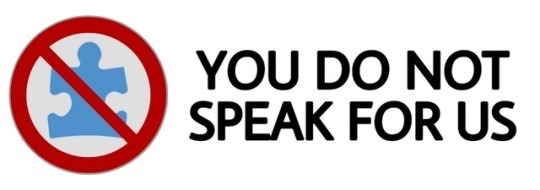
Some autistic people benefit from autism being treated as an otherwise harmless trait that’s disabling only because of society’s lack of acceptance.
Some autistic people benefit from autism being treated as inherently disabling.
But none benefit from neurotypical people deciding for us.
If someone says something that you only partially understand:
DON’T ask for clarification with a generic “What?” or “I’m sorry?” (In my experience, people will repeat the phrase the exact same way without helping you to understand).
Example:
Them: “Hey, do you like pahganabasa?”
Autistic Person: “What?”
Them: “Do you like pahganabasa?”
Autistic Person: “I’m sorry, what?”
Them (annoyed): “Do you like pahganabasa?”Instead, DO repeat the part that you did understand, and substitute a “What?” for the unintelligable part.
Example:
Them: “Hey, do you like pahganabasa?”
Autistic Person: “Do I like what?”
Them: “Pineapple pizza?”
Autistic Person: (Understands the words!)I’ve also had successes with “I’m sorry, I only heard the first half of that sentence,” or actually verbalizing my interpretation of the part I heard incorrectly as a question: “Pahgana… basa?”.
Sometimes that makes the speaker think that they might be mumbling, or verbalizing in a way that makes them difficult to understand (because there are times it’s really not your brain–it’s their mouth).
This is also a lifesaver if you have Auditory Processing Disorder. It stopped the amount of annoyed sighs because ppl thought I was deliberately ignoring them or them saying the same thing but louder (which does not help when volume isn’t the problem)




bless this absolutely stunning animation
SHARE YOUR STIMS!!!
MY STIMS:
-Flapping my hands
-Hitting my face
-Drumming my fingers
-Bouncing my leg
-Humming
-Wiggling my toes
-Running my thumbs between my fingers
-Tapping my feet
-Chewing on the skin in my mouth
-Pressing my lips together
-Rocking around
-Swinging my legs
-Rubbing my nose
-Pulling on the skin around my eyes
-Clenching my knees
-Hopping
AUTISM AND FOOD: BASIC INFO
***TRIGGER WARNING/TW: FOOD***
I feel like a thing which doesn’t get brought up enough with autism is how autism affects eating habits. I want to shine some light on the subject of autism and eating!
AUTISM AND EATING HABITS
Many autistic people are hypersensitive to textures and tastes (especially textures). Due to sensory sensitivity and the desire to have routine being common traits of autism, many autistic folks are very specific eaters. Some autistic people will have a very strict diet consisting of a small variety of foods. (Quick note: not all autistic people are picky eaters and some do enjoy a large variety of food.) Some autistic people have what they call safe foods and unsafe foods. These classifications are used very often in discussions of autistic eating habits. Here are definitions for safe and unsafe foods.
Safe foods: foods which an autistic person finds comforting. Basically foods which are safe to eat.
Unsafe foods: foods which are repulsive and gross. Unpleasant textures usually make foods unsafe.
MY OWN EATING HABITS ON THE AUTISM SPECTRUM:
I myself am somewhat of a picky eater but I’m also adventurous too with foods. I have specific foods I’ll happily eat, but am willing to try new dishes too. I’ll either have the strong desire to try new foods from new countries or I will be unable to eat something if it is cooked slightly different or with an ingredient I can’t handle. Since I am vegetarian I do need to be more open minded about what I eat. After all, I need to get all my nutrients so I can stay healthy.
I will write now a list of my safe foods and unsafe foods…
MY SAFE FOODS:
-Paneer Makhani (a super delicious tomato based Indian curry with delicious soft cheese in it)
-Starbucks Pink Drink (a nice cold strawberry beverage that I’ve been drinking consistently every morning since 2018. It can’t be too sweet though so I usually ask for extra coconut milk in it.)
-Majority of spicy dishes (I love the sensation of spicy peppers)
-Tofu especially of the silken variety
-A pizza with goat cheese and pineapples on it that I get at a specific pizza chain
-The Kraft mac n cheese they make at certain restaurants
-Water that is very cold
-Grapes, watermelon, strawberries, and apples that are nice and firm
UNSAFE FOODS (FOOD THAT REPULSES ME:)
-Beverages with pulp in them
-Mushy foods like avocados or bananas
-Soggy foods
-Yogurt that hasn’t been stirred properly (I dislike the lumpy texture)
-The skin of fruits and vegetables
-Squishy fruits and vegetables
-Room temperature water
-The seeds of tomatoes (I love tomatoes, but have to scoop out the seeds in order to enjoy the tomato)
-Sparkling water (it makes me gag)
-Greasy foods (if pizza is soggy it’ll make me nauseous)
-Pasta that is too soft
-Cheese that is too melted (cheese that has bubbled)
***
Feel free to reblog! If you’re autistic and willing to share your safe/unsafe foods, feel free to add on to this post with your safe/unsafe foods.
(I’ll do a more comprehensive post on autism and food later)
TO ANY AUTISTIC PERSON WHO MAY BE READING THIS…
-Your special interests are wonderful and I hope you get the opportunity to share them!
-Your stims are all amazing! Keep flapping, rocking, using stim toys, or stimming in the ways you naturally do!
-If you don’t like being touched, making eye contact, or dislike certain sensory sensations, that is valid! No one can fault you for that!
-Neurotypical rules can definitely get verrrrryyyy confusing at times so it’s ok to have times where you don’t understand them!
-You are not a burden for being autistic! The real burdens are ignorance and ableism, not you.
-Your autism is valid regardless of its traits! Autism appears differently in everyone! Neurotypicals don’t police your autism.
-If you feel alone in this neurotypical world, just know that there is a whole community of autistic & neurodiverse people who can empathize with you and stand by you!
with love
-gwyntheautisticbutch <3
***TRIGGER WARNING/TW: SEXUAL TOPICS/SEX***
A very common misconception that many neurotypicals have is that autistic people do not experience ANY sexual or romantic attraction. This often stems from the rather ableist practice of infantilizing autistic people/treating autistic people like they’re children. To clear up one thing, plenty of autistic folks are asexual and/or aromantic. Ace, aro, and aroace autistics are wonderful and valid. The main thing is that not all autistic people are asexual/aromantic or incapable of feeling romantic or sexual attraction and plenty of autistic people would like to date or have sex.
Due to a lot of narratives pushed by many neurotypicals, organisations like Autism $peaks, and Hollywood, many people think autistic people are either unfeeling robots or heavily incapable of taking care of themselves. Because of these ignorant stereotypes as well as the emotional maturity/feelings that sex and romance requires, people become squeamish at the thoughts of autistic people feeling romantic or sexual desire.
Contrary to what has been pushed on many people, autistic sexuality is complex and multidimensional. Autistic people can be straight, gay, lesbian, bisexual, asexual etc. I am an autistic lesbian and I experience both intense feelings of romantic and sexual attraction. Many of my autistic friends experience romantic and/or sexual attraction too. Autistic sexuality much like autism itself isn’t just black and white, instead a whole scale of color. Some autistic people are hypersexual. Others are sex repulsed. Others feel occasional romantic/sexual feelings, but not too strongly.
The belief that autistic people are incapable of feeling romantic or sexual attraction is an inaccurate one which hopefully will fade away as the years go on and society’s understanding of autism increases.

